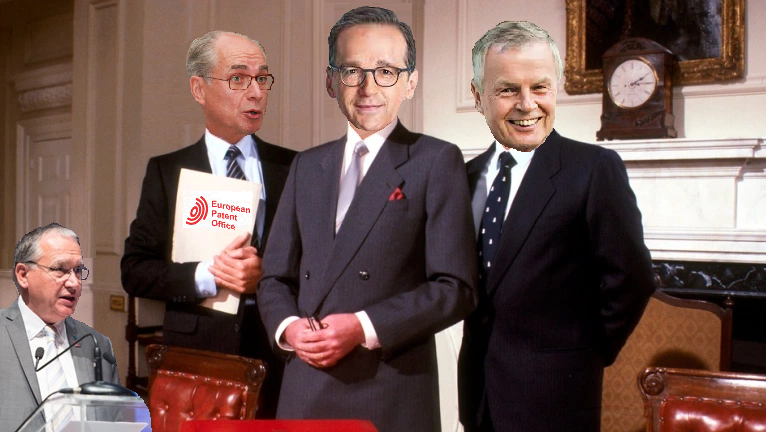

As we have seen, the matter of the EPO's deficient data protection framework was placed on the agenda [PDF] of the Legal Affairs Committee of the Bundestag at its meeting scheduled for 14 October 2015.
"All that remained for Ernst to do was to work the usual EPOnian “copypasta”..."In preparation for this meeting, Christoph Ernst was tasked with drafting the Justice Ministry's submission to the Legal Affairs Committee.
As explained in the last part, Ernst was assisted in this task by his mentor, Raimund Lutz, EPO Vice-President (and former official of the Justice Ministry), who provided his protégé with a carefully formulated statement of the EPO's position.
All that remained for Ernst to do was to work the usual EPOnian "copypasta" magic and serve up the result [PDF] in the form of a Memorandum ("Informationsvermerk") for the Legal Affairs Committee.

Ernst prepared the Justice Ministry's Memorandum for the Legal Affairs Committee of the Bundestag using the usual EPOnian "copypasta" skills.
"In his Memorandum to the Legal Affairs Committee, Ernst parroted the old EPOnian myth about the "close alignment" between the EPO's data protection framework and European data protection law."The Committee was informed about the EPO's "relatively high standard of data protection compared to other international organizations" – as if that could be considered a source of comfort!
Ernst also took pains to point out that the establishment of independent external supervision, for example by the European Data Protection Supervisor, would impinge on "the institutional foundations of the EPO" and would require an amendment to the European Patent Convention.
This would in turn necessitate a diplomatic conference of the contracting states which meant that the change desired by the BfDl "could not be implemented easily or quickly".
When it came to the controversial issue of covert surveillance, Ernst carefully followed the cues provided by Lutz and informed the Committee that "according to the internal law of the EPO, the computer surveillance was lawful and proportionate and did not violate the rights of the person concerned".
In any case - so the Committee was told - there was no need for concern because anybody who considered that their rights had been violated would have adequate access to "legal protection" via the EPO's data protection officer – aptly described by Florian Müller of FOSS Patents as a "dictator's minion" - and via the organisation's notoriously dysfunctional internal appeal procedures.
Based on these considerations, the Legal Affairs Committee of the Bundestag was informed of the BMJV's opinion that "a regulatory gap is not considered to exist".
"When it came to the controversial issue of covert surveillance, Ernst carefully followed the cues provided by Lutz..."Finally, Ernst assured the Committee that "the Justice Ministry will continue - both within and outside the Administrative Council - to ensure compliance with high data protection standards".
For good measure, the Memorandum concludes with another generous serving of humbug about the "Current social situation at the EPO".
Ernst explained here that "[t]he BMJV is actively working to improve the situation at the EPO and has been instrumental in initiating a renewal of the social dialogue in the Administrative Council, which is to take the form of a trialogue between the EPO President, the staff unions and representatives of the Administrative Council" and he emphasised that "the BMJV conducts many background discussions with all sides and is continuously striving for a fresh start".
All of this neatly skirts around the elephant in the room, namely that the underlying cause of the social conflict at the EPO was the failure of the Administrative Council - under Ernst's stewardship - to enforce its authority over the rogue Office President, the latter-day Corsican despot Battistelli.
It seems that Ernst's "copypasta" Memorandum was enough to persuade the honourable members of the Legal Affairs Committee that everything was fine and dandy in the fairytale land of EPOnia and that there was no need for further action on their part.
The members of the Committee were also told in no uncertain terms that - even if they were inclined to pursue the matter further - the change desired by the BfDl would require a diplomatic conference and for this reason "could not be implemented easily or quickly".
And so it was that - with the aid and assistance of the head of the EPO's Directorate of Legal and International Affairs - Christoph Ernst managed to head Ms Voßhoff and her posse off at the pass, thereby averting the "doomsday scenario" of a public exposure of the deficiencies in the organisation's data protection framework.
"All of this neatly skirts around the elephant in the room, namely that the underlying cause of the social conflict at the EPO was the failure of the Administrative Council - under Ernst's stewardship - to enforce its authority over the rogue Office President, the latter-day Corsican despot Battistelli."To the great relief of Team Battistelli the impending threat of external "interference" in the affairs of the autonomous fiefdom of EPOnia had been successfully neutralised and the spectre of a diplomatic conference was banished for the foreseeable future.
Of course no other outcome could have realistically been expected, given that the German Justice Minister at the time in question was Heiko Maas.
In the next part we shall take a closer look at Justice Minister Maas and his relationship with the EPO during the Battistelli era. ⬆